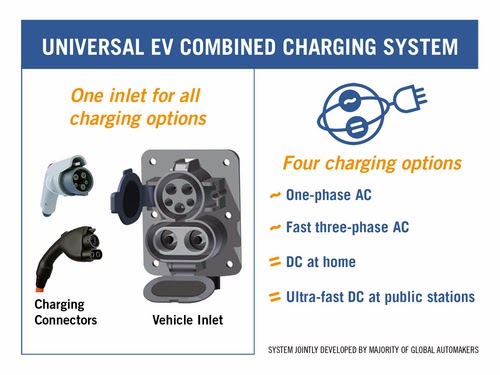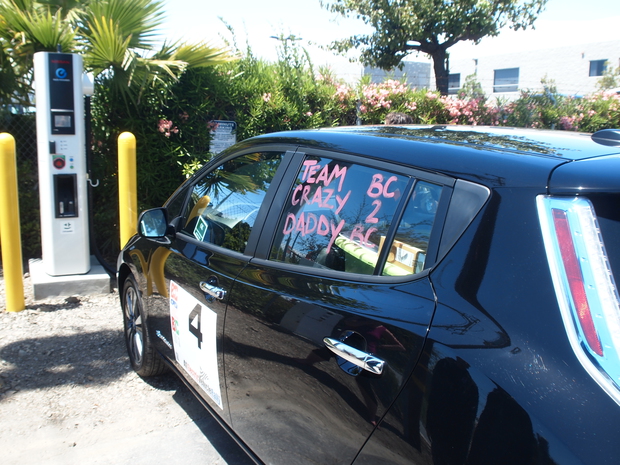It would be wonderful if there were one fast charging standard for electric cars. We’ve collectively gone through periods with dueling standards, and it was painful. But, the current environment has several fast charging standards (CHAdeMO, China, Combined Charging System, and Tesla) each of which are vying for dominance. Recently on Automobilewoche.de, an article quoted several top people in Germany’s electric car industry complaining about the Tesla Supercharger system, and how much better it would be for public fast charging infrastructure to be based on standards.
While we agree with the sentiment, the people making those statements have their own agenda – to assure dominance of the Combined Charging System. Further, the phrasing is similar to what Shad Balch (General Motors) said in May 2012 in a California State Senate public hearing on electric car charging infrastructure. Both Balch and these Germans rest their argument on CCS being the Standard, so therefore that’s the only fast charging system which should be deployed.
At that meeting Balch laid out for State Sen. Corbett a series of priorities GM has in fostering electric vehicle adoption, the last of which had to do with charging standards. He started by saying the J1772 standard was a big improvement over the previous era of electric cars and non-standardized charging connectors. But he described the current situation as a “hodgepodge of fast charging standards” and said, “we need to make sure, especially because we’re talking about taxpayer money, that ONLY those standards are installed going forward.” He actually got boooo’d at that point, because everyone in the audience knew he was slamming CHAdeMO.
With that in mind, here’s what the Germans were quoted saying:
- Dr. Arndt Neuhaus, CEO of RWE Germany: “When charging infrastructure Tesla uses a proprietary system instead of an open system, in the computer industry, this approach has not been implemented so far. Electric mobility has to rely on open standards to be quickly mass market. I have to use with my plug each charging station in Europe. A separate plug does not help there.” (original: „Bei der Ladeinfrastruktur nutzt Tesla ein proprietäres System statt eines offenen Systems, in der Computerindustrie hat sich dieser Weg bislang nicht durchgesetzt. Die Elektromobilität muss auf offene Standards setzen, um schnell massenmarkttauglich zu werden. Ich muss mit meinem Stecker jede Ladesäule in Europa nutzen können. Ein eigener Stecker hilft da nicht.“)
- Daimler Chief Development Officer said Thomas Weber: “The future lies in the standardization. As with the petrol filling stations and we need a cross-vendor charging network because not least can thus reduce the cost of infrastructure and comfortable is for the customer.” (original: „Die Zukunft liegt in der Standardisierung. Wie auch bei den Kraftstofftankstellen brauchen wir ein herstellerübergreifendes Ladenetz, weil sich damit nicht zuletzt die Infrastrukturkosten reduzieren lassen und es für den Kunden komfortabler wird“)
- Bosch Boss Volkmar Denner: “There would be economically nonsense, now if any vehicle manufacturers would set up its own infrastructure. Much more useful would be if the variety of charging stations owners for the customer would not be relevant because the software in the background takes care of everything for him. When we are dealing since long with small-minded discussions, then we get into a serious imbalance. The technique for a Europe-wide charging network we have.We need it now but really want to implement.” (original: „Es wäre doch volkswirtschaftlich ein Unsinn, wenn jetzt jeder Fahrzeughersteller seine eigene Infrastruktur aufstellen würde. Viel sinnvoller wäre doch, wenn die Vielfalt an Ladesäulenbesitzern für den Kunden gar nicht relevant wäre, weil die Software im Hintergrund alles für ihn regelt. Wenn wir uns da noch lange mit kleinkarierten Diskussionen beschäftigen, dann kommen wir in eine bedenkliche Schieflage. Die Technik für ein europaweites Ladenetz haben wir. Wir müssen es jetzt aber auch wirklich umsetzen wollen.“)
The translations probably aren’t that good, but we get the gist of it to be a call for standardized electric car charging systems, rather than the hodge-podge of systems currently in use.
It’s possible they’re calling on Tesla to submit the Supercharger system to standardization. But, it’s much more likely that they’re calling on Tesla to simply adopt one of the open standards rather than going their own way.
To my eyes after having observed this issue since 2010 (see The controversy in fast charging for electric vehicles (PlugIn 2010)![]() ) that an allegation many make could well be true. Namely, that the German and American car makers colluded in the SAE committee to ensure that CHAdeMO did not get standardized in an effort to throw a monkey wrench into Nissan’s plans for electric car dominance.
) that an allegation many make could well be true. Namely, that the German and American car makers colluded in the SAE committee to ensure that CHAdeMO did not get standardized in an effort to throw a monkey wrench into Nissan’s plans for electric car dominance.
Consider that neither the American nor German car companies have yet to deploy electric cars with Combo Charging System plugs in any respectably sized quantity, while both Nissan and Tesla are going full speed ahead with selling fast-charge-capable electric cars, and both are supporting deployment of fast charging stations. Can you say “late for the game”?
(CCS cars: Chevy Spark EV, miniscule quantities. BMW i3, just started production last month in reasonably large quantities. That’s it. Ford, VW, nor the other members of the anti-CHAdeMO consortium have announced any CCS cars. Just today, Ford revealed some info on the 2015 Ford Focus Electric, and it’s clear from the images that it does not have a CCS compatible charging port.)
It’s a little disingenuous to call for standards, and then not be selling many electric cars that comply with the standard. CCS will not be a useful standard until there are a large number of vehicles implementing that standard.
Dr. Neuhaus alluded to the computer industry as not being controlled by closed systems. That’s an interesting point, and the rise of the Internet is directly attributable to open standards that any company could implement. But that doesn’t mean the Computer Industry doesn’t have closed systems. Microsoft’s Windows is just one example of a closed system, and Apple’s iPhone is another example. It hasn’t always been true that open systems always win out over closed systems, either. What is always true is that numbers win, the system with the largest sales is what wins.
In February, Nissan installed the 1000’th CHAdeMO charger in Europe![]() .
.
On Monday, Nissan announced a deal to install 100 CHAdeMO charging stations in Germany.![]()
Both Nissan and Tesla are going full steam ahead with fast charger deployments in North America.
In Europe, Tesla Motors has a few Supercharger stations in Norway, Germany and the Netherlands, and by the end of the year plans an extensive system covering most of Western Europe and Scandinavia.
That leaves us wondering how market cohesion will come about, or will the electric car fast charging market continue on divergent paths? If the latter we know it will be painful. At best we’ll end up with a hodge-podge of adapters such as the one Tesla is now selling that allows Model S owners to recharge at a CHAdeMO station. It’s theoretically possible to develop a CHAdeMO-CCS adapter, but wouldn’t be economically viable until there’s enough such cars on the market.
- Highway design could decrease death and injury risk, if “we” chose smarter designs - March 28, 2015
- GM really did trademark “range anxiety”, only later to abandon that mark - March 25, 2015
- US Government releases new regulations on hydraulic fracturing, that some call “toothless” - March 20, 2015
- Tesla Motors magic pill to solve range anxiety doesn’t quite instill range confidence - March 19, 2015
- Update on Galena IL oil train – 21 cars involved, which were the supposedly safer CP1232 design - March 7, 2015
- Another oil bomb train – why are they shipping crude oil by train? – Symptoms of fossil fuel addiction - March 6, 2015
- Chevron relinquishes fracking in Romania, as part of broader pull-out from Eastern European fracking operations - February 22, 2015
- Answer anti- electric car articles with truth and pride – truth outshines all distortions - February 19, 2015
- Apple taking big risk on developing a car? Please, Apple, don’t go there! - February 16, 2015
- Toyota, Nissan, Honda working on Japanese fuel cell infrastructure for Japanese government - February 12, 2015















